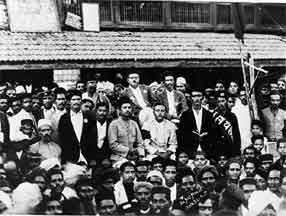1931 Indian Congress Illegal British Crackdown
In January 1932 the British government declared the Congress Party illegal and again arrested Gandhi. The government took extraordinarily repressive measures to crush the demonstrations that followed.
.
In January 1932, the British colonial government in India, led by the then Viceroy Lord Willingdon, declared the Indian National Congress (INC) illegal and arrested its key leaders, including Mahatma Gandhi. This crackdown was a response to the intensifying civil disobedience movement against British rule, which had gained momentum following the Salt March in 1930.
Repressive measures taken by the British authorities included:
-
Arrests: Thousands of INC members and leaders were arrested, including Gandhi, who was imprisoned in the Yerwada Central Jail. The mass arrests were meant to weaken the INC's organizational structure and disrupt the movement's momentum.
-
Censorship: The British government imposed strict censorship on the Indian press to prevent the spread of anti-colonial sentiment and control the narrative around the civil disobedience movement. Newspapers and publications that were critical of British rule faced severe restrictions, and many were shut down or had their editors imprisoned.
-
Police and military force: The British government deployed police and military forces to suppress demonstrations, protests, and other acts of civil disobedience. The authorities often resorted to brutal force, including baton charges, tear gas, and even firing on protesters in some instances, resulting in numerous injuries and deaths.
-
Confiscation of property and imposition of fines: The British government seized properties of those involved in the civil disobedience movement and imposed heavy fines to deter further participation. These measures had severe economic consequences for those affected and their families.
Despite these repressive measures, the Indian independence movement continued to grow in strength and resilience. The British government's actions only served to fuel the desire for freedom among the Indian population. The widespread protests and acts of civil disobedience eventually forced the British to engage in negotiations with Indian leaders, including the Round Table Conferences in the early 1930s.
While the talks did not result in immediate independence, they did signify a shift in the British government's approach to dealing with the Indian question. T
 >
>